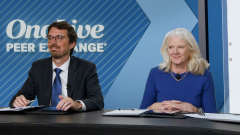
Addressing Unmet Needs in Nonmetastatic CRPC
Before closing out their second module, panelists highlight remaining unmet needs in the setting of nonmetastatic castration-resistant prostate cancer.
Episodes in this series

Transcript:
Evan Y. Yu, MD: Let’s wrap this session up with one last question. In this question, I am going to bring to Andy. What do you see as the greatest unmet need? What do we need to be focusing on for patients with this disease state, non-metastatic castration resistance prostate cancer? What should we be doing?
Andrew J. Armstrong, MD, MSc: Thanks Evan, this is a great question but the elephant in the room to me and if I were a patient would be what the curative therapies are. We are talking about kicking the can down the road with these agents, but you are still going to get resistance three years later. The PSMA/PET has taught us that you can see disease but what we don’t know is whether you should treat it and whether treating that metastasis maybe layered on or best systemic therapy can result in remissions off therapy that could allow you to stop treatment some day and get off of these therapies, maybe an immunologic therapy, maybe a checkpoint that we haven’t checked yet could be helpful. And then developing drugs that are non-cross resistance, you can get patients into durable remissions and stop therapy like we see with so many other cancer types.
Evan Y. Yu, MD: What about PSMA/PET driven oligometastatic directed therapy, do you think that’s something that needs to be tested?
Andrew J. Armstrong, MD, MSc: It could, needs to be tested.
Pedro C. Barata, MD, MSc: Right now, we have phase 2 data supporting that and basically it’s either delayed time to initiation of systemic therapy, so this oral PSA responses that’s what we are lacking has actually proved the point that impacts the endpoints. We can see their value and FDA will take it. We are getting there fast but with that said there are a lot of folks with utilization of novel imaging they are using such an approach and we have bunch of data. I am thinking as one example, we have many others to support those approaches in clinical practice.
Evan Y. Yu, MD: Thank you all so much. There are a lot of advances but still a lot more work to be done which is hope for the future.
Transcript edited for clarity.








































